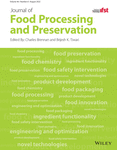Energy consumption and efficiency measures in the Portuguese food processing industry
Abstract
Simple energy surveys and audits were performed in 60 processing industries of meat, dairy, horticultural and bread and pastry products, located in the North, Center, and Alentejo regions of Portugal. The number of refrigeration chambers, building infrastructure, and energy consumptions of the equipment used in the manufacturing processes were evaluated. The energy consumption of different manufacturing processes of regional food products were compared. The study aims to present several measures and best practices for the improvement of energy efficiency of the food sector. The implementation of simple and very cost-effective transversal electricity savings measures such as awareness and/or training of operators, proper maintenance, and monitoring tasks, can benefit this sector. The tailored energy efficiency measures by sector are discussed. These energy efficient practice measures can offer savings at several levels, increasing productivity and competitiveness and improving the environmental impact, and thus the global sustainability of the Portuguese food sector.
Practical applications
The adoption of efficiency measures by SMEs provides them the necessary instruments to become more competitive and dynamic in the market, due to the reduction of the energy costs. This condition allows funds to be redirected to areas such as logistics, ensuring an expansion to international markets. This paper presents several measures of energy efficiency, many of which require small investments. The objective of this study is to provide a reference guide, with the purpose of qualifying SMEs for the adoption of strategies to increase their competitiveness, productivity, and efficiency.
CONFLICT OF INTEREST
The authors have declared no conflicts of interest for this article.




